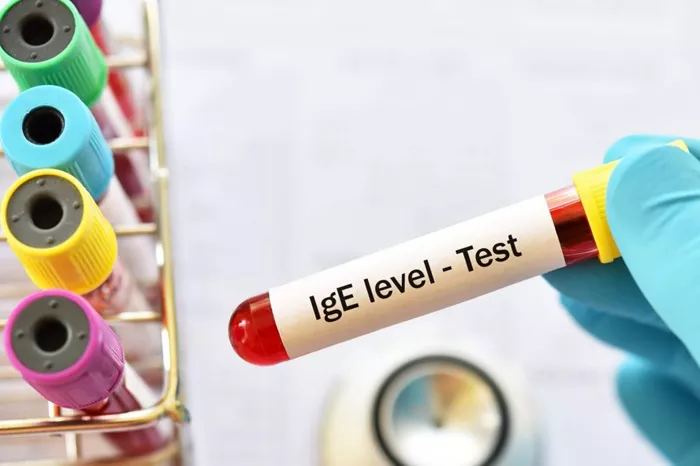Immunoglobulin E (IgE) plays a critical role in the body’s immune response, particularly in allergic reactions and defense against parasitic infections. The IgE test, which measures the level of IgE antibodies in the blood, is a crucial tool for diagnosing allergies, asthma, and certain immune system disorders. This article delves into what IgE test is for, the purpose and procedure of the IgE test, and its implications for patient care.
What is Immunoglobulin E (IgE)?
Immunoglobulin E (IgE) is one of the five major classes of immunoglobulins (antibodies) produced by the immune system. Unlike other antibodies that are more common and play broader roles in immune defense, IgE is primarily involved in the body’s allergic response and defense against parasitic infections.
Structure and Function of IgE
IgE antibodies are Y-shaped molecules with two antigen-binding sites. They are produced by plasma cells in response to exposure to allergens or parasitic antigens. Once produced, IgE binds to receptors on the surface of mast cells and basophils, types of white blood cells involved in allergic reactions.
When an allergen enters the body and binds to IgE on these cells, it triggers the release of histamines and other inflammatory chemicals, leading to the symptoms of an allergic reaction, such as itching, swelling, and mucus production.
Purpose of the IgE Test
The IgE test is primarily used to diagnose and manage allergic conditions. By measuring the total amount of IgE in the blood or the specific IgE levels to particular allergens, healthcare providers can identify allergic sensitizations and tailor treatment plans accordingly.
Diagnosing Allergies
Allergies are the most common reason for conducting an IgE test. Common allergic conditions diagnosed with IgE testing include:
Allergic Rhinitis: Also known as hay fever, this condition is characterized by symptoms like sneezing, runny nose, and itchy eyes caused by allergens such as pollen, dust mites, or pet dander.
Food Allergies: IgE testing helps identify allergies to specific foods such as peanuts, shellfish, eggs, and milk, which can cause reactions ranging from mild itching to severe anaphylaxis.
Asthma: Elevated IgE levels are often associated with allergic asthma, a condition where allergens trigger inflammation and narrowing of the airways, causing difficulty in breathing.
Atopic Dermatitis: Also known as eczema, this skin condition can be triggered or worsened by allergens. IgE testing can help identify the contributing allergens.
Identifying Parasitic Infections
In regions where parasitic infections are prevalent, IgE testing can help diagnose conditions such as helminth infections. Elevated IgE levels can indicate the presence of parasites like roundworms, hookworms, or schistosomes.
Evaluating Immune System Disorders
Certain immune system disorders, such as Hyper-IgE Syndrome (HIES), are characterized by abnormally high levels of IgE. Testing for IgE can aid in the diagnosis and management of these rare conditions.
Types of IgE Tests
There are two primary types of IgE tests: the total IgE test and the specific IgE test. Each type serves a different purpose and provides unique information about the patient’s immune response.
Total IgE Test
The total IgE test measures the overall amount of IgE antibodies in the blood. While it does not specify which allergens are causing the elevated IgE levels, it provides a general indication of the body’s allergic response or immune activity. Elevated total IgE levels can suggest the presence of an allergic condition, parasitic infection, or certain immune disorders.
Specific IgE Test
The specific IgE test, also known as an allergen-specific IgE test, measures the amount of IgE antibodies directed against specific allergens. This test is more informative for diagnosing particular allergies. Common methods for specific IgE testing include:
Skin Prick Test: Small amounts of suspected allergens are introduced into the skin, and the area is observed for reactions such as redness or swelling.
Blood Test: The most common blood test for specific IgE is the radioallergosorbent test (RAST) or its modern counterpart, the enzyme-linked immunosorbent assay (ELISA). These tests measure the level of IgE antibodies in the blood against specific allergens.
See Also: How Does Chlamydia Affect You Mentally?
Procedure for Conducting an IgE Test
The IgE test is a straightforward procedure that involves drawing a blood sample from the patient. Here’s a step-by-step overview of how the test is conducted:
Preparation
Generally, no special preparation is required for an IgE test. However, patients should inform their healthcare provider about any medications they are taking, as some drugs can affect IgE levels.
Blood Sample Collection
A healthcare professional will draw a blood sample from a vein in the patient’s arm. This process typically involves:
Cleaning the Area: The skin over the vein is cleaned with an antiseptic to prevent infection.
Applying a Tourniquet: A tourniquet is applied to the upper arm to make the veins more prominent.
Inserting the Needle: A needle is inserted into the vein, and blood is collected into a vial or syringe.
Removing the Needle: Once enough blood is collected, the needle is removed, and a bandage is applied to the puncture site.
Laboratory Analysis
The blood sample is sent to a laboratory for analysis. Depending on the type of IgE test ordered (total or specific), the lab will measure the levels of IgE antibodies and report the results to the healthcare provider.
Interpreting IgE Test Results
Understanding the results of an IgE test involves comparing the patient’s IgE levels to reference ranges and considering their clinical history and symptoms.
Total IgE Levels
Total IgE levels are measured in International Units per milliliter (IU/mL). The reference range for total IgE varies with age, but elevated levels generally indicate an increased likelihood of an allergic condition or parasitic infection. However, high IgE levels alone do not confirm a specific diagnosis and must be interpreted in conjunction with other clinical findings.
Specific IgE Levels
Specific IgE test results are reported in terms of concentration (kU/L). The results are often categorized into classes, ranging from Class 0 (no detectable allergen-specific IgE) to Class 6 (very high levels of allergen-specific IgE). Higher classes indicate a stronger allergic sensitization to the tested allergen.
Factors Influencing IgE Levels
Several factors can influence IgE levels, including:
Age: IgE levels can vary with age, typically peaking in childhood and gradually declining in adulthood.
Genetics: A family history of allergies can predispose individuals to higher IgE levels.
Environmental Exposure: Frequent exposure to allergens or parasites can lead to elevated IgE levels.
Medications: Certain medications, such as corticosteroids, can suppress IgE production.
Clinical Implications of IgE Test Results
The results of an IgE test can significantly impact patient care, guiding diagnosis, treatment, and management strategies.
Confirming Allergy Diagnosis
Specific IgE testing is crucial for confirming suspected allergies. By identifying the specific allergens responsible for a patient’s symptoms, healthcare providers can recommend targeted avoidance strategies and appropriate treatments, such as antihistamines, corticosteroids, or allergen immunotherapy.
Managing Asthma
For patients with asthma, elevated IgE levels, especially specific IgE, can indicate allergic asthma. This information helps in tailoring treatment plans, including the use of inhaled corticosteroids, bronchodilators, and possibly biologic therapies targeting IgE (e.g., omalizumab).
Limitations of IgE Testing
While IgE testing is a valuable tool, it has limitations that must be considered when interpreting results and making clinical decisions.
False Positives and Negatives
IgE tests can produce false-positive and false-negative results. False positives may occur due to cross-reactivity with other allergens, while false negatives can result from low levels of IgE that are not detectable despite the presence of an allergy.
Not Definitive Alone
IgE test results should not be used in isolation to make a diagnosis. They must be interpreted in the context of the patient’s clinical history, symptoms, and other diagnostic tests. A comprehensive evaluation by an allergist or immunologist is often necessary for accurate diagnosis and management.
Variability in Test Methods
Different laboratories may use varying methods and reference ranges for IgE testing, leading to inconsistencies in results. It is essential for healthcare providers to consider these variations when interpreting test outcomes.
Conclusion
The IgE test is a pivotal diagnostic tool in identifying and managing allergic conditions, asthma, parasitic infections, and certain immune disorders. By measuring the levels of IgE antibodies in the blood, healthcare providers can gain valuable insights into a patient’s immune response and tailor treatment plans to improve outcomes. Understanding the purpose, procedure, and interpretation of IgE tests is essential for both clinicians and patients in the journey towards better health and well-being.
[inline_related_posts title=”You Might Be Interested In” title_align=”left” style=”list” number=”6″ align=”none” ids=”10479,10427,10434″ by=”categories” orderby=”rand” order=”DESC” hide_thumb=”no” thumb_right=”no” views=”no” date=”yes” grid_columns=”2″ post_type=”” tax=””]































